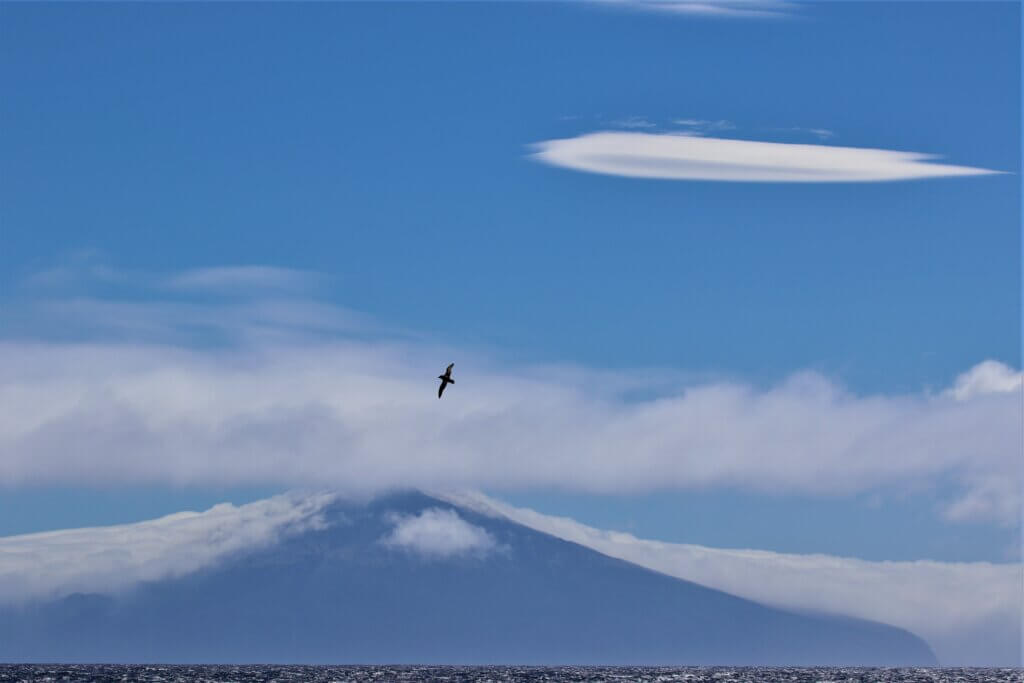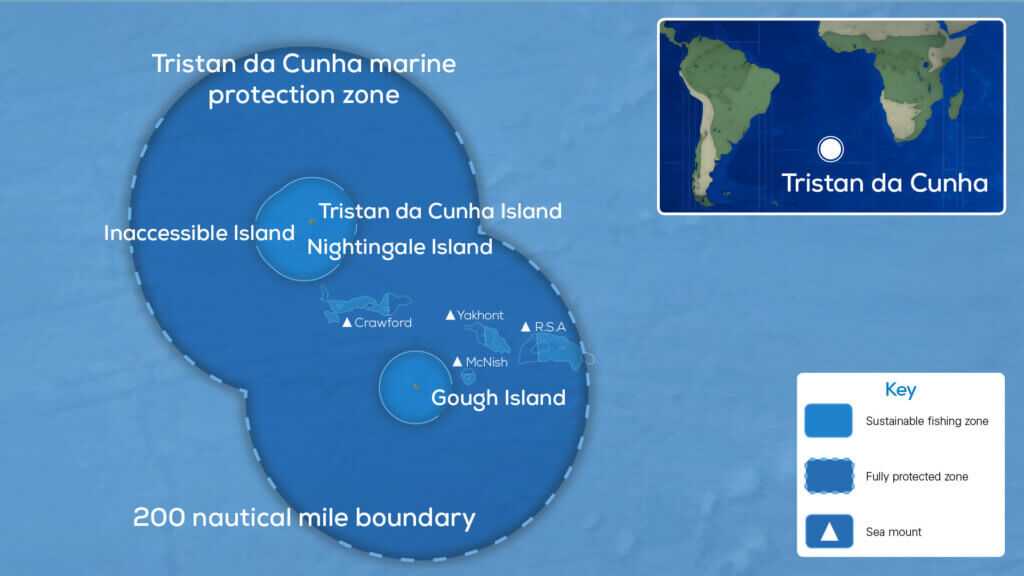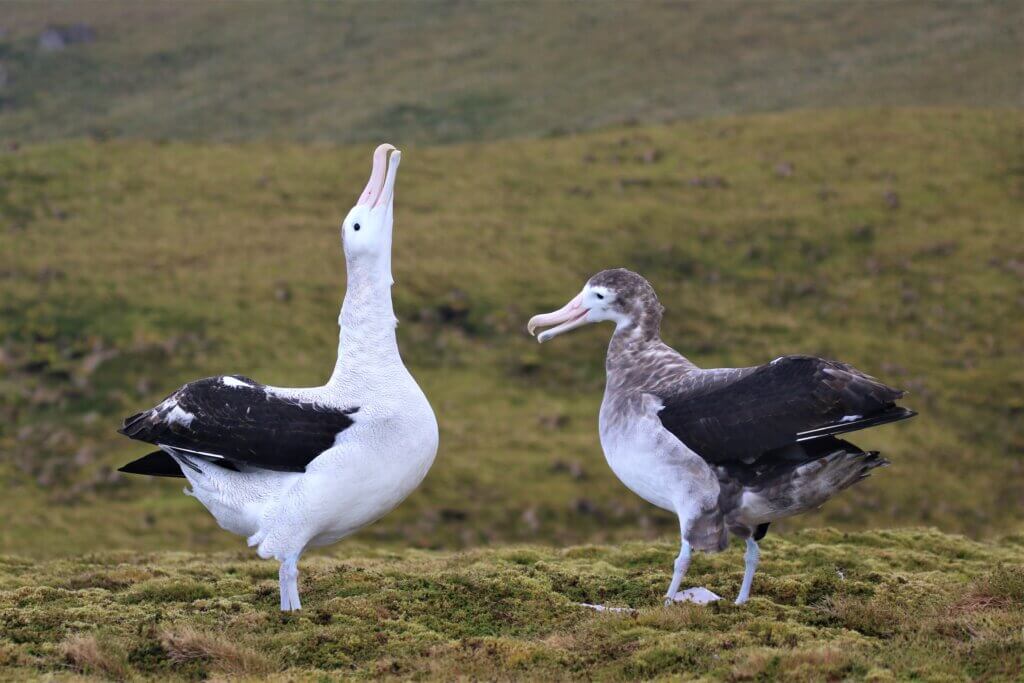
UK Overseas Territory becomes one of the world’s biggest sanctuaries for wildlife
- The Government and people of Tristan da Cunha make visionary declaration with support of an international partnership including the UK Government, RSPB, National Geographic Pristine Seas, Blue Nature Alliance, Becht Family Charitable Trust together with Blue Marine Foundation, Wyss Foundation, Kaltroco, Don Quixote II Foundation, British Antarctic Survey, University of Plymouth & the Natural History Museum
- The small group of islands becomes the largest no-take zone in the Atlantic in what is one of the most significant environmental announcements in the world this year
- The largely untouched wildlife haven is home to tens of millions of seabirds including albatross and penguins, plus whales, sharks and seals
Today, the most remote inhabited island on Earth becomes one of the world’s biggest sanctuaries for life above and below the waves thanks to an international partnership that is supporting the local community and protecting nature.

The community of Tristan da Cunha, a small chain of islands over 6,000 miles from London in the South Atlantic has declared that almost 700,000km2 of its waters will join the UK’s Blue Belt of marine protection, becoming the largest no-take zone in the Atlantic and the fourth largest on the planet.
The 687,247km2 Marine Protection Zone – almost three times the size of the UK – will safeguard one of the world’s most pristine marine environments and protect the wealth of wildlife that lives there. The Marine Protection Zone around Tristan is the gold standard of marine protection, with no fishing or other extractive activities permitted across the whole area, also known as a ‘no-take zone’. This move makes the Tristan islanders the guardians of the largest no-take zone in the relatively unprotected Atlantic Ocean.
A recent study by the University of California and the National Geographic Society (see notes) found that banning fishing in 5 per cent or more of the ocean would boost global fish catches by at least 20 per cent in future.
The announcement, made by the Tristan da Cunha Government, helps the UK Government with its ambition to lead the global effort to tackle the nature crisis and secure protection of 30% of the world’s oceans by 2030. The UK has a duty to protect the wildlife found in all of its Territories and will be responsible for long-term monitoring and enforcement of this vast Zone.

Tristan da Cunha has a long history of protecting its unique environment. This latest success is the result of 20 years of hard work. It began with the RSPB working with the Government of Tristan da Cunha to lay the conservation groundwork and support Tristan’s exemplary management of its sustainable lobster fishery, then the five-year programme of UK Government Blue Belt support, followed by an international coalition of partners who have generously supported the final phase. The RSPB along with National Geographic also partnered with the Blue Nature Alliance, Becht Family Charitable Trust together with Blue Marine Foundation, Wyss Foundation, Kaltroco and Don Quixote II Foundation to enable this large-scale declaration.
Tristan da Cunha is an archipelago located 2,400km from the nearest land. It takes longer to sail to Tristan da Cunha from Cape Town than it took Apollo 11 to reach the Moon.
James Glass, Tristan da Cunha Chief Islander, said: “Today we’re delighted to announce our Marine Protection Zone, exactly 25 years after we declared Gough Island in the Tristan group a UNESCO World Heritage Site.
Our life on Tristan da Cunha has always been based around our relationship with the sea, and that continues today. The Tristan community is deeply committed to conservation: on land, we’ve already declared protected status for more than half our territory. But the sea is our vital resource, for our economy and ultimately for our long-term survival. That’s why we’re fully protecting 90% of our waters – and we’re proud that we can play a key role in preserving the health of the oceans.
The Blue Belt Programme, RSPB and many others have been valuable partners in helping Tristan da Cunha develop its marine protection strategy. Our long-term relationships have been a strong foundation for this project: to help ensure the unique biodiversity of our archipelago, for the future population of the planet.”
Beccy Speight, the RSPB’s chief executive, said: “This is a story two decades in the making, starting with the RSPB and Government of Tristan da Cunha commencing a conservation partnership, and culminating in the creation of this globally important protected area. The new Tristan MPZ will be the biggest no-take area in the Atlantic; the jewel in the crown of UK marine protection as an area where no extractive activities are permitted.
Tristan da Cunha is a place like no other. The waters that surround this remote UK Overseas Territory are some of the richest in the world. Tens of millions of seabirds soar above the waves, penguins and seals cram onto the beaches, threatened sharks breed offshore and mysterious whales feed in the deep-water canyons. From today, we can say all of this is protected.
In 2020 the importance of having nature in our lives has never been clearer. While Tristan da Cunha may be far away in distance it is still close to our hearts and protecting it is still the UK’s responsibility. Closer to home, the crisis facing nature is also huge. So huge that our wellbeing, our economic future, and our very survival depend on the choices we make now about the natural world. We need politicians to emulate the leadership of this small community to help us build the world we all want to live in. We hope today’s fantastic announcement is the first of many more that help revive our world.”
Enric Sala, National Geographic Society Explorer-in-Residence, said: “It is testament to the vision of the Tristan da Cunha community that one of the world’s smallest communities can make the single biggest contribution to global marine conservation this year. We can all look to Tristan for inspiration as the world commences a decade of work to protect 30% of the global ocean by 2030.
The UK Government also deserves great credit for completing its 2016 ‘Blue Belt’ commitment to protect at least four million square kilometres of ocean across its Overseas Territories by the end of 2020.” .
UK Minister for the Environment, Lord Goldsmith, said: “We are hoovering life out of the ocean at an appalling rate, so this new marine protected area is really a huge conservation win and a critically important step in protecting the world’s biodiversity and ecosystems.
Tristan da Cunha islanders and this coalition of NGOs and Foundations have done an extraordinary thing and deserve real gratitude and praise. It means our fantastic Blue Belt programme has over 4 million square kms of protected ocean around the UK Overseas Territories.”.
The creation of the Marine Protection Zone is only possible thanks to the far-sighted leadership of the Tristan da Cunha Government and the support of an international partnership. The RSPB-led work on the ground with the local community to enable their visionary decision-making, working with the UK Government Blue Belt Programme, National Geographic Pristine Seas and the Great British Oceans coalition. British Antarctic Survey, University of Plymouth and the Natural History Museum also provided key scientific support to the Tristan da Cunha Government.
With support from:



-ENDS-
[registration_form]
Congratulations to all concerned. I am not sure who would be the main divers behind this terrific project but I suspect the RSPB were in there “big time” as well as the Tristan da Cuna Government.
This is a major achievement. The protection of wildlife in the UKs Overseas Territories is vital as they hold (as I understand) more than 90% of the threaten species that come under the UK’s jurisdiction.
This large area will need to be policed otherwise it will be a sanctuary in name only. I hope adequate finance is being made available to do this.
Not sure how much of a hand the U.K. Government had/ has in this project but they must have had quite a bit. It would seem they are rather better at protecting our wildlife overseas than here in the U.K. where they are very poor at it.
Yoru last line would have been my comment, too. We seem very good at helping our UKOT governments and partners create very extensive MPAs (which around some territories do still have fisheries, very well managed and sustainable) but hopelessly rubbish at making them in UK Waters. And those which do exists have frequent damage and breaches of the rules protecting them
This is fantastic news. The people of TDC seem to be a particularly wonderful lot. I read a story of a young American man who spent some time there and cried bitterly when he had to leave. On the long voyage back to land he was renowned for standing at the bows staring back in the direction of the island all day, every day. I’m struggling to think of a better endorsement for a place than that. On the subject of the British Overseas Territories I think everybody needs to take a look at ‘ Britain’s Treasure Islands’ by Stewart McPherson, it accompanies the BBC series of the same name from a few years back. It’s one of the most incredible books I’ve ever seen, amazingly detailed to a degree that you’ll find hard to believe. Bermuda, the Falklands, St Helena, Ascension, Tristan Da Cunha etc all covered – marine life, endemic species, human history, conservation. https://www.amazon.co.uk/Britains-Treasure-Islands-Overseas-Territories/dp/190878721X